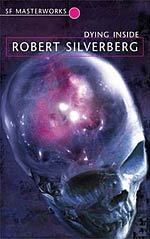
![]() Bormgans
Bormgans
1/31/2017
![]()
Okay, first things first: Dying Inside is not really a scifi book. It's a rather small story about David Selig, living in the second half of 20th century America. Selig can read minds--only he and one other guy he meets can do this--and his power is diminishing. That's it. No speculative science, no future worlds, no space stuff, nothing, just one guy who inexplicably can read minds. That's not a negative, it's just something candidate readers should know.
Dying Inside easily fits in with earlier scifi, taking mental powers seriously--just like books as diverse as Foundation And Empire (1952), Childhood's End (1953), The Demolished Man (1953), More Than Human (1953), The Santaroga Barrier (1968) or The Lathe Of Heaven (1971).
In a way, Dying Inside is the most pure of all those: Silverberg doesn't give justifications for Selig's powers, there's no paranormal scientific framework, no Freudian veneer, no nothing. Selig's powers are a coincidence. On the surface level, it's just a character study of a speculative character losing his mutant mental power. On top of that, Selig doesn't do anything spectacular with his powers. He doesn't try to make money out of it, there's no action, no mystery plot, no sleuthing. So, space opera fans should look elsewhere for their dose of entertainment.
All these caveats aside: I liked Dying Inside. Why? What's a way to approach and appreciate this novel? I don't care much for the approach of Michael Dirda--Washington Post book critic--who points to the easily recognized surface metaphor: yes, Dying Inside is about a character realizing he will die someday, "a common human sorrow, that great shock of middle age". I don't feel Silverberg has particularly interesting or profound things to say about that shock. So, another approach maybe?
(...)
Please continue reading this review on Weighing A Pig...
https://schicksalgemeinschaft.wordpress.com/2017/01/31/dying-inside-robert-silverberg-1972/